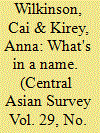|
|
|
Sort Order |
|
|
|
Items / Page
|
|
|
|
|
|
|
| Srl | Item |
| 1 |
ID:
178248


|
|
|
|
|
| Summary/Abstract |
Leading feminist scholars and activists have critiqued the current impact of South Africa’s provisions for gender equality and sexual rights. The country boasts one of the most progressive constitutions in the world, and its formal mechanisms for gender transformation and sexual citizenship are – at a global level – pathbreaking. At the same time, however, violence against women, gender non-conforming people and gays and lesbians or ongoing gender-based injustices in workplaces, educational institutions and many homes testify to the fact that such measures have not transformed ideological beliefs, institutional cultures and power relations in many public and domestic contexts. This article confronts the disjuncture between the formal provision of rights and actual practice, by analysing the effects of provisions devoid of transformative impact. It is argued that the country’s seemingly democratic arrangements for gender justice and sexual citizenship reproduce new forms of governmentality, biopolitics and biopower. By drawing on the work of Jasbir Puar, the article argues that South Africa’s imagining as a democratic state is based largely on its provision of rights around sexuality and gender, and in relation to peripheries that are ‘measured’ by the absence of these. In the global imagining, gender equality and sexual citizenship currently serve as tropes for definitive freedoms and democracy. The recognition of gender equality and sexual citizenship ratifies a particular international understanding of ‘democracy’, one that is congruent with global neoliberal standards, and that actively reproduces the gendered, heteronormative, classist and racist status quo.
|
|
|
|
|
|
|
|
|
|
|
|
|
|
|
|
| 2 |
ID:
101299


|
|
|
|
|
| Publication |
2010.
|
| Summary/Abstract |
In this article, we focus on the ways in which non-heterosexual and transgender youth involved with the non-governmental organization 'Labrys' in Kyrgyzstan have begun to demand the protection of their basic civil and human rights on the basis of self-identification as 'LGBT'. This acronym, which stands for Lesbian, Gay, Bisexual and Transgender, is relatively new to Kyrgyzstan and other post-Soviet states, and represents a change in the terms used by non-heterosexual and transgender people to describe themselves. We frame our discussion using the concepts of sexual citizenship, private/public divides and stigma and base our discussion on debates amongst the staff and community of Labrys about the purpose and scope of the organization. Centrally, we suggest that the strategic use of 'LGBT' as a public and politicized identity represents a new, pro-active form of stigma management. By employing this strategy, young LGBT people become 'would-be' sexual citizens and challenge traditional societal norms that seek to keep discussion of sex and sexuality in the private sphere and restrict rights to heterosexual, cisgender citizens.
|
|
|
|
|
|
|
|
|
|
|
|
|
|
|
|
|
|
|
|
|